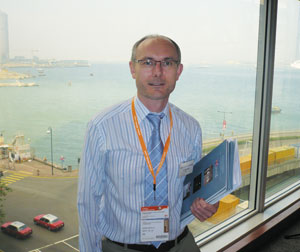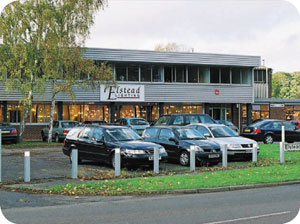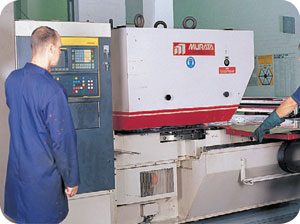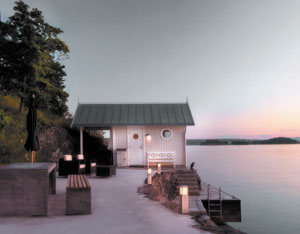Jonathan Lucas of Top British Lighting Maker Elstead Lighting Talks Shop
2009/01/13 | By Ken LiuJonathan Lucas, managing director of British lighting maker Elstead Lighting Ltd., has managed to turn the firm into Britain's leading home-lighting maker since taking over the family business in 1990 from father and uncle, who co-founded the workshop in 1965. Unlike his predecessors specializing in handcraftsmanship, Lucas has applied modern know-how to make his business more competitive and quality-oriented.

CENS Lighting staff reporter Ken Liu interviewed Lucas at the Honk Kong International Lighting Fair 2008, held in late October, during which the director shed light on his business amid the global financial fallout, his corporate strategies, and industry trends.
Q: How is the British lighting market?
A: It is dominated by Asian imports, with maybe 20% from Europe. Elstead Lighting is the largest remaining manufacturer of residential lighting for the market. The British market struggles terribly being probably the most seriously impacted after the USA...because British financial institutions are closely linked to American institutions and the close ties between the two nations.
And the economic downturn and banking crisis have unsettled consumers and businesses.
Q: Are you pessimistic about the future market?
A: Not for my company. Because we're spreading our risks. We've exported to Russia and the Middle East, and are in discussions with North American and Asian buyers.
Whilst the home market has not grown for more than a year, I think the economies in other markets remain strong. If the global slowdown starts affecting the Middle East and Russia then maybe it will be more difficult for us. But we're a young and small company, so we have many opportunities to develop and new relationships to build. For me, I'm still quite positive.

A: It's very diverse. Historically, the British market has been an upscale, affluent market. But a lot of low-priced players are now even more successful because of the economic crisis. That said, there remains demand for good designs and more-expensive items of good quality and high added-value.
Q: How do you deal with underselling competition?
A: In some markets consumers want good designs without the high British prices. So we can meet such requirements by outsourcing from China.
We run the factory in China exclusively for our company. Therefore, we transfer the staff training and skills between the two businesses. The very high standard that we've set for our U.K. operation is also used in our China factory, which is only in a different location but not a very cheap factory. It's just a manufacturing skill set not so easily found in the U.K. now. Britain has many more developed high-tech industries like pharmaceutical, biotechnical and aeronautical. So, we have a tough time finding traditional manufacturing skills as welding, forging, and machining. So, it is hard to expand in the U.K. but not in China, which has a good source of well-trained staff with the right mindset. And the two nations blend well together.
So, we're here to meet new customers. In the past two days we had buyers from 44 countries showing interest to work with us.

A: This year we've launched a range of very traditional English-style garden lamps. For years, we've designed the lamps with LED technology. And with high-end LEDs, which are the most efficient and high-performance, the lamps are bright, save energy, and have long lifespan. They are attractive to consumers for easy installation, safety, efficiency and long life. So even paying more initially will mean savings in the long term. We've been quite successful with that.
Q: Since LED is still relatively expensive, are British consumers willing to pay more than for traditional lamps?
A: More and more they're prepared to do so...especially considering they consume very little power. Many consumers worldwide are aware of both the cost of energy and resources needed to produce energy. Using less energy at home helps the environment. Consumers worldwide, not just the British, all want to play a small part to reduce energy use at home.
Q: How is the volume of LED lighting consumption in Britain?
A: Its growth is very large. LED was first seen about five years ago in the market and the growth has been considerable in the last two years. Most consumers today know about LED lamp in Britain, because they have so many LED appliances, such as torch, car lights, bike lights and home lighting. So there is popular recognition of LED as a product and its merits.
Q: What is the trend in garden lamp design?
A: The majority of the market still wants traditional-looking fixtures, but with very modern light sources. The market currently is very strong for traditional styles because the plants, trees today have not changed in two or three hundred years. So the demand for fixtures really seems toward more traditional than very modern. We find strong demand for a blend of traditional lamps with very modern technology. And the same taste is found in North America, New Zealand, Australia, Japan, Europe and Russia.

A: Many companies do solar technology, but its performance is not very good in terms of brightness. If you have a plant or a tree under a light, it is impossible to light the area properly with solar. Using 40 solar lamps along a path would show its direction in the dark; however, you have to use LEDs to effectively light the adjacent area.
Our unique technological strength is using electronics with LEDs, which allows us to run more than 100 meters of cable off one power source, hence eliminating the need to put main power supply all around a garden. Therefore, it's much safer. European power is 220-240 volts, so you can be electrocuted by touching a main supply.
Also not many traditional low-voltage lighting such as MR16 can be installed per transformer. And MR16 burns very hot...too hot to touch after half an hour. This means it is hazardous for children playing in the garden and expensive plants. The heat from MR16s, particularly in temperate countries, can kill such plants. In contrast, LED are very cool and hence very safe.
Q: What about incandescent lighting in the U.K.? Has the British government imposed limitations?
A: Yes. They will ban by the end of 2010 all 150-watt and 100-watt GLS (general light service) lamps, which are conventional incandescent bulbs. So, super markets and big retailers are not even stocking the products. Within one more year, these bulbs have to be replaced by more efficient light sources.
Q: Are you still making incandescent products?
A: We make decorative fixtures that use low-energy, LED or incandescent lamps, and it is up to consumers to choose or our retailer customers to sell. But we're trying to encourage retailer customers and consumers to change to more environment-friendly lamp sources. Within two years, incandescent manufacturing will be closed throughout Europe, not just in the U.K.
Q: Elstead Lighting is the U.K.'s No.1 home lighting maker. What is the company's winning strategy?
A: It's a family business. So, I grew up learning from my father and uncle, who taught me production and engineering. Being trained in business and finance in college, I have been able to blend both those disciplines. Upon taking over the business in 1990, my strategy then was growing the business as a producer to sell more worldwide, not just in the home market.
We remain the largest British producer because we have very good engineers. In product design, we don't just design lighting fixtures, but also all elements for efficient manufacturing...by using modern technology such as CNC machinery and automatic painting line to streamline as much as possible.
Still, we use many handmade processes, but blending them with modern manufacturing techniques that allow us to be competitive globally. For sure, our costs are higher than in China because of European level salary and overhead. But our production efficiency is far greater than in Asia because investing in machinery, technology is much cheaper than in labor. Investing in CNC machines cost less in the long-term as it is more reliable, precise than humans.
In addition, we benefit from technological transfers from bigger British engineering organizations, who teach us to improve, modernize manufacturing and techniques. This is the only way we can continue to survive because the world is a very small marketplace.
We have to be efficient and competitive in price to be successful. And, of course, we must have good quality and design. We invest a lot time in design to make sure our products are fresh. Even fresh ideas can come from classic designs.
Q: So you must have a strong army of designers?
A: We have one head designer and outsource with professional companies as well. Some companies have major in-house designers. But I've seen many companies achieve success by outsourcing designs and lighting manufacturing is that sort of business. Therefore, they think not what other companies are doing, but completely afresh.
Although we are more of a traditional product-based company, we can present to customers products they like. They like our style and detailing...design is discussed every day within the company.
Q: Comment on your quality assurance?
A: We guarantee our outdoor fixture finishes for 10 years. China-made products can rust very quickly. Offering such a long warranty makes sense because why sell a LED lamp lasting 20 years when the finish lasts only one?
Q: How do you protect intellectual property?
A: We register all the components and finished designs we create with the Anti-Copying In Design (ACID), who assist us to challenge the copycats or importers when shown evidence of imitation. They help us to stop such products going to market.
ACID handles all types of products, not just lighting. It's a very large, professional organization developing a worldwide name for protection of good design.
We do not make low-cost products and target professional retailers and contractors looking for well designed, safe, quality, certified lighting.
Q: Do you follow the "diversified production in small volume" model as most Taiwanese manufacturers to compete against low-end rivals?
A: Diversified production is critical for us. We can change from producing one product to another every hour. We don't produce tens of thousands of one product a day; while we must move as fast as we can when demand arises or a customer's stock is running low.
Q: So, the company must have invested heavily in tooling?
A: We make a lot of tooling in-house for two reasons-cost and speed. Developing a new product line is also a business opportunity because the first to make a product presentation is the one likely to win orders. So, we always want to be very quick...able to offer samples of new items in three days after a meeting. We begin delivery usually in 20 days after completing tooling and production.
Q: So you can precisely grasp what your customers need efficiently?
A: Yes. We meet with customers regularly. Also, our sales team communicates with customers daily. Customers sometimes visit our factories to give us requirements, and immediately we act on them. An overseas customer visited for two days once...giving us some idea on the first day, and we presented them the prototype the second day. So, speed is very important. (Nov. 2008)




